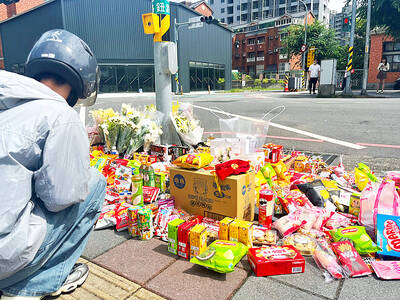Japan’s prime minister signaled yesterday authorities would keep intervening to curb yen strength as sagging manufacturing confidence underscored the threat the currency poses to the fragile economic recovery.
A Reuters monthly poll that tracks the Bank of Japan (BOJ) tankan report showed manufacturing confidence dropped this month from last month for the first time in nearly a year as firms struggled with the yen’s rise to a 15-year high against the US dollar.
Responding to the concerns about the yen’s rise, authorities intervened in markets on Wednesday for the first time in six years to knock the currency lower by selling an estimated ¥2 trillion (US$23 billion).
Japanese Prime Minister Naoto Kan pointed yesterday to more yen selling if needed.
“If rapid fluctuations in the yen harm Japanese firms’ appetite for investing at home and push them to shift their factories overseas, that could further worsen job conditions and affect [our efforts] to overcome deflation,” Kan said.
“I will take decisive steps if needed from now on as well,” he told a business group.
Some currency traders see the likelihood of another round of intervention would increase if the US dollar slipped back below ¥85. It yesterday traded at ¥85.4, having strengthened from around ¥83 before the intervention.
Kan, struggling to unify his party and facing a divided parliament, wants to be proactive in tackling the yen after winning the ruling party leadership race on Tuesday.
He is expected to reshuffle his Cabinet soon, but retain Yoshihiko Noda as finance minister.
“He [Kan] is trying to send a message of his party’s solidarity. He is showing the strong intention of Japan to take decisive action through intervention,” said Ayako Sera, a market strategist at Sumitomo Trust & Banking.
A panel of junior lawmakers in the ruling Democratic Party of Japan urged the BOJ to call an extraordinary meeting to ease policy and so support the government’s efforts.
Central bank sources have said the authority has no plan to call an emergency meeting, but it is ready to act at its next scheduled meeting early next month if the economic recovery remains under threat.
The panel suggested that the BOJ increase its buying of Japanese government bonds, although BOJ Governor Masaaki Shirakawa reiterated his opposition to the idea.
“We hardly observe the fact that massive expansions in central bank balance sheets result in an increase in inflation in advanced economies,” Shirakawa said in a conference speech.
Shirakawa told a securities dealers’ gathering later yesterday that the BOJ would take timely action as needed and keep providing ample funds to money markets.
In addition, sources familiar with the matter said on Wednesday the BOJ would not drain the money flowing into the economy as a result of the selling, indicating it plans to use the sold yen as a monetary tool to boost liquidity in the economy.

Nvidia Corp yesterday unveiled its new high-speed interconnect technology, NVLink Fusion, with Taiwanese application-specific IC (ASIC) designers Alchip Technologies Ltd (世芯) and MediaTek Inc (聯發科) among the first to adopt the technology to help build semi-custom artificial intelligence (AI) infrastructure for hyperscalers. Nvidia has opened its technology to outside users, as hyperscalers and cloud service providers are building their own cost-effective AI chips, or accelerators, used in AI servers by leveraging ASIC firms’ designing capabilities to reduce their dependence on Nvidia. Previously, NVLink technology was only available for Nvidia’s own AI platform. “NVLink Fusion opens Nvidia’s AI platform and rich ecosystem for

WARNING: From Jan. 1 last year to the end of last month, 89 Taiwanese have gone missing or been detained in China, the MAC said, urging people to carefully consider travel to China Lax enforcement had made virtually moot regulations banning civil servants from making unauthorized visits to China, the Control Yuan said yesterday. Several agencies allowed personnel to travel to China after they submitted explanations for the trip written using artificial intelligence or provided no reason at all, the Control Yuan said in a statement, following an investigation headed by Control Yuan member Lin Wen-cheng (林文程). The probe identified 318 civil servants who traveled to China without permission in the past 10 years, but the true number could be close to 1,000, the Control Yuan said. The public employees investigated were not engaged in national

ALL TOGETHER: Only by including Taiwan can the WHA fully exemplify its commitment to ‘One World for Health,’ the representative offices of eight nations in Taiwan said The representative offices in Taiwan of eight nations yesterday issued a joint statement reiterating their support for Taiwan’s meaningful engagement with the WHO and for Taipei’s participation as an observer at the World Health Assembly (WHA). The joint statement came as Taiwan has not received an invitation to this year’s WHA, which started yesterday and runs until Tuesday next week. This year’s meeting of the decisionmaking body of the WHO in Geneva, Switzerland, would be the ninth consecutive year Taiwan has been excluded. The eight offices, which reaffirmed their support for Taiwan, are the British Office Taipei, the Australian Office Taipei, the

DANGEROUS DRIVERS: The proposal follows a fatal incident on Monday involving a 78-year-old driver, which killed three people and injured 12 The Ministry of Transportation and Communications yesterday said it would lower the age for elderly drivers to renew their license from 75 to 70 as part of efforts to address safety issues caused by senior motorists. The new policy was proposed in light of a deadly incident on Monday in New Taipei City’s Sansia District (三峽), in which a 78-year-old motorist surnamed Yu (余) sped through a school zone, killing three people and injuring 12. Last night, another driver sped down a street in Tainan’s Yuching District (玉井), killing one pedestrian and injuring two. The incidents have sparked public discussion over whether seniors